Some obstacles to democracy in Canada
May 24th, 2009 | By Citizen X | Category: Canadian Republic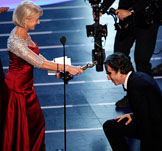 Pierre Trudeau’s essay “Some Obstacles to Democracy in Quebec” was first published in the old Canadian Journal of Economics and Political Science in August 1958 – when Premier Maurice Duplessis was still shouting orders to the Speaker of the Quebec legislative assembly. French Canadians, Trudeau wrote at the time, “must begin to learn democracy from scratch. For such is the legacy of a history during which [among other things] … as Catholics … they believed that authority might well be left to descend from God.”
Pierre Trudeau’s essay “Some Obstacles to Democracy in Quebec” was first published in the old Canadian Journal of Economics and Political Science in August 1958 – when Premier Maurice Duplessis was still shouting orders to the Speaker of the Quebec legislative assembly. French Canadians, Trudeau wrote at the time, “must begin to learn democracy from scratch. For such is the legacy of a history during which [among other things] … as Catholics … they believed that authority might well be left to descend from God.”
There is no one quite like Maurice Duplessis in Canadian federal politics today. (Those not currently in jail who share the opinions of Conrad Black might even want to add unfortunately.) But there is concern in the Ottawa air that in 2009 we are “Witnessing a democracy’s decline.” A learned book has just been published on Canadian federal politics with the somewhat ominous title Parliamentary Democracy in Crisis. And a meeting at Metro Hall in Toronto this past still-so-called Victoria Day holiday could make you wonder whether all this is, in some important enough degree, the legacy of a history in which especially English-speaking Canadians, as constitutional monarchists, have believed that authority actually does descend from the Divine Right of Kings (and nowadays Queens too, of course).
* * * *
 I attended the event at Metro Hall myself, 14 PM ET, Monday, November 18, 2009. The master of ceremonies was Phil Taylor of radio station CIUT’s The Taylor Report. And the lead speaker was Peter Donolo, Director of Communications for Prime Minister Jean Chrtien from 1993 to 1999, and currently an executive vice president and partner at the polling and consulting firm The Strategic Counsel.
I attended the event at Metro Hall myself, 14 PM ET, Monday, November 18, 2009. The master of ceremonies was Phil Taylor of radio station CIUT’s The Taylor Report. And the lead speaker was Peter Donolo, Director of Communications for Prime Minister Jean Chrtien from 1993 to 1999, and currently an executive vice president and partner at the polling and consulting firm The Strategic Counsel.
It suggests at least something about both the Canadian present and future that a political insider quite as eminent as Peter Donolo is speaking at something called Canada after the Queen: Options and opportunities – a forum about the growth of public opinion for ending the monarchy and what Canada should be doing to prepare for a republic.
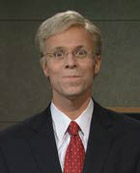 There were also remarks from Tom Freda, national director of the sponsoring organization, Citizens for a Canadian Republic, and from Charles Roach, the Toronto civil rights lawyer who is leading a pioneering Charter of Rights court challenge of the current compulsory oath to the offshore Queen across the sea for new Canadian citizens.
There were also remarks from Tom Freda, national director of the sponsoring organization, Citizens for a Canadian Republic, and from Charles Roach, the Toronto civil rights lawyer who is leading a pioneering Charter of Rights court challenge of the current compulsory oath to the offshore Queen across the sea for new Canadian citizens.
The comic and satirist Alan Park, a regular cast member on CBC’s Air Farce LIVE, heaped much amusing good-natured abuse on an increasingly obsolete institution. (Her majesty the Queen of England is nothing more than a corporation. It’s like swearing allegiance to Kentucky Fried Chicken.) My friend and colleague Randall White offered some slightly less comedic and vaguely more respectable remarks as well, on the constitutional ins and outs of abolishing the British monarchy in Canada at last. And he has kindly allowed me to reproduce these remarks here, for whoever may or may not be interested:
Canada after the Queen: Options and opportunities
We live in an age of renewal and re-invention, Barack Obama told us last week. And this sums up my feelings about our topic today – Canada after the Queen: Options and opportunities.
Cutting our very last apron string to the offshore monarch far away in Buckingham Palace, at the end of the present reign of Elizabeth II, or even earlier, will open up a new age of renewal and re-invention in Canada. And that’s exactly what we need, I think, if our unique Canadian institutions are going to survive the 21st century.
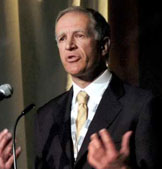 I also agree with Bob Hepburn at the Toronto Star, in his column just this past week, It’s time Canada said goodbye to the Queen. As he has pointed out: Over the past 15 years, polls have repeatedly shown the majority of Canadians favour abolishing our ties to the monarchy.
I also agree with Bob Hepburn at the Toronto Star, in his column just this past week, It’s time Canada said goodbye to the Queen. As he has pointed out: Over the past 15 years, polls have repeatedly shown the majority of Canadians favour abolishing our ties to the monarchy.
Yet as Bob Hepburn has explained as well: it will take … time before Canada says goodbye to the Queen. This is partly because, he goes on, few of us care deeply about the issue and few politicians dare to rock the boat. It is also, I think, because, as the opponents of saying goodbye like to stress, when you start to think about it the exercise is bound to be somewhat complicated.
To me the main conclusion from all this is that, however long it may take to reach the ultimate objective, it’s time right now to start sorting out the complications – so that we will be prepared, e.g., if the present reign of the 83-year-old Elizabeth II should unhappily come to a sudden end.
What I am going to do here, just to stimulate debate, is quickly suggest four such complications – and how they might be managed in a new Canadian age of renewal and re-invention.
The Canadian people … don’t ask, don’t tell
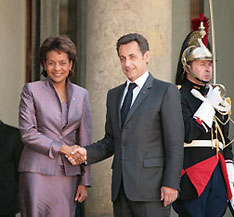 The first complication concerns a matter of principle. As things stand, the practical sovereign power in Canada today is the Canadian people who, among other things, vote in elections and referendums. Yet what is now known as the Constitution Act 1867 still prescribes that the formal or theoretical sovereign power in Canada is the British monarch.
The first complication concerns a matter of principle. As things stand, the practical sovereign power in Canada today is the Canadian people who, among other things, vote in elections and referendums. Yet what is now known as the Constitution Act 1867 still prescribes that the formal or theoretical sovereign power in Canada is the British monarch.
What saying goodbye to the Queen means in this context is saying hello to the Canadian people, in both theory and practice. And what some opponents of saying goodbye to the Queen argue here is that Canada has still not evolved to the point where there is such a thing as a Canadian people, capable of taking over sovereign power from the British monarch, theoretically as well as practically. Our policy now about the Canadian people, if you like, is don’t ask, don’t tell.
I don`t myself agree with this point of view at all. But I do think we who want to say goodbye to the Queen have to frankly recognize that the modern Canadian people constitute a quite complicated and diverse historical phenomenon. We stretch from the fur-trading first nations in the 16th century to the latest new Canadian citizens from around the world in the 21st century. We have two official languages, and a dazzling rainbow of cultural origins in the global village.
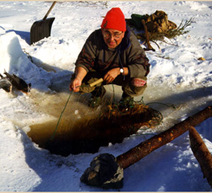 I ran into an intriguing document in this connection, while doing research for the Charter of Rights challenge to the compulsory Canadian citizenship oath to the Queen, currently being advanced by Charles Roach, Michael McAteer, Ashok Charles, and others, in the Ontario courts.
I ran into an intriguing document in this connection, while doing research for the Charter of Rights challenge to the compulsory Canadian citizenship oath to the Queen, currently being advanced by Charles Roach, Michael McAteer, Ashok Charles, and others, in the Ontario courts.
This document is a 1996 article by the Osgoode Hall Law School professor Brian Slattery, called The Organic Constitution: Aboriginal Peoples and the Evolution of Canada. Its key argument is that Aboriginal peoples should be viewed as active participants in generating the basic norms that govern us – not as people on the fringes. They are where the Canadian people begin. And, Brian Slattery urges, understanding this at last in our time represents a further stage in the long process of decolonization that Canada has undergone since 1867.
Saying goodbye to the Queen will represent the very last stage in this long process of decolonization. Meanwhile, what do we have to do about the aboriginal beginnings of the Canadian people, to get ready for saying goodbye properly? Happily, I think, what is needed has already been at least begun, in sections 25 and 35 of the Constitution Act 1982, which recognize the historic rights of the aboriginal peoples of Canada. But there are a few other particular dimensions to the present-day Canadian people that still do need some ultimate constitutional clarification. And I will come back to this at the end of my remarks.
The parliamentary democratic alternative …Â India and Ireland as models
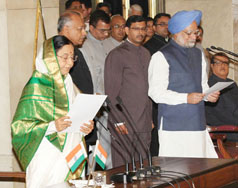 The second complication I want to talk about focuses on the question what are we going to replace the British monarchy in Canada with? Or, who is going to personify the newly sovereign Canadian people, in form as well as practice, in the institutions of government?
The second complication I want to talk about focuses on the question what are we going to replace the British monarchy in Canada with? Or, who is going to personify the newly sovereign Canadian people, in form as well as practice, in the institutions of government?
Some among those who do not want to say goodbye to the Queen claim that the only serious answer to this question is the presidential-congressional system of government that prevails in the United States. And, they add triumphantly, this is outside Canada’s historic traditions. For Canada to adopt this alternative would be tantamount to joining the United States.
In fact, however, most members of the present Commonwealth of Nations are republics. And the majority of republics in the world today are not modelled on the United States, but on republicanized versions of the traditional British-style parliamentary institutions that Canada continues to share with such places as Ireland and India.
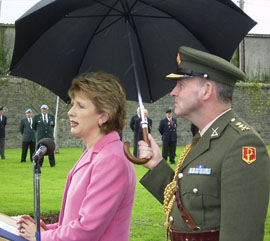 The trick here is in principle simple enough, and has been done before by other former British dominions like Canada. You just convert the present appointed office of governor general, as de facto head of state responsible to the offshore Queen, into some form of elected head of state in law as well as practice, responsible to the Canadian people.
The trick here is in principle simple enough, and has been done before by other former British dominions like Canada. You just convert the present appointed office of governor general, as de facto head of state responsible to the offshore Queen, into some form of elected head of state in law as well as practice, responsible to the Canadian people.
Bob Hepburn’s Toronto Star column of this past week does an excellent job of summarizing all this, I think. And I can’t do any better than quote him directly: Most Commonwealth countries dropped their ties to the monarchy long ago without creating constitutional or political chaos. Most have a prime minister, who leads the elected government, and a president, who is the largely ceremonial head of state … There are several ways to elect a head of state. For example, in India the president is elected by members of parliament and state legislatures. In Ireland, the president is directly elected by all voters … Canada could safely choose either route. And if too many Canadians are upset over the title president’ because of its American connotations, then we could find a less controversial title.
In principle, we could start working on reforming or democratizing our present office of governor general, to get it ready for this kind of ultimate republican transformation, right away – without broaching any controversial constitutional amendments. For this we would need a very high-minded and public-spirited prime minister in office. And whether such a person actually exists at the moment I won’t try to predict. But in the history of this country so far, I think it’s fair to say, stranger things have happened!
The McWhinney shuffle … something worth thinking about at least
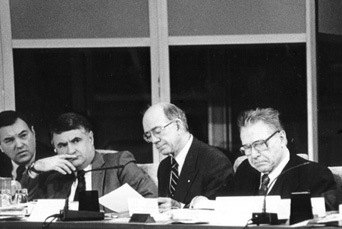 The last two complications of saying goodbye to the offshore Queen both relate to certain technicalities of amending the current provisions about the British monarchy in the Canadian constitution. And the first thing to underline here is that we almost have two written constitutions in Canada today (as well as a rather mysterious unwritten one). We have an old written constitution now known as the Constitution Act 1867, and a still fairly new one called the Constitution Act 1982 (which also contains the Canadian Charter of Rights and Freedoms).
The last two complications of saying goodbye to the offshore Queen both relate to certain technicalities of amending the current provisions about the British monarchy in the Canadian constitution. And the first thing to underline here is that we almost have two written constitutions in Canada today (as well as a rather mysterious unwritten one). We have an old written constitution now known as the Constitution Act 1867, and a still fairly new one called the Constitution Act 1982 (which also contains the Canadian Charter of Rights and Freedoms).
Certain sections of the Constitution Act 1867 in its current state still prescribe the Queen’s formal sovereignty over Canada today (sections 9, 17, and 128 are among the most obvious examples). On the other hand, political scientists like the now retired Frederick Vaughan of the University of Guelph have urged that the republicanism of Prime Minister Pierre Trudeau’s Canadian Charter of Rights and Freedoms [in the Constitution Act 1982] has severed Canadians from their ancestral monarchical foundations.’
Yet, to wave goodbye altogether to the monarchy in Canada we will have to amend the monarchist sections of the old Constitution Act 1867. And despite its underlying republicanism, the amending formula prescribed in the Constitution Act 1982, for changes to the office of the Queen, requires the approval of the Senate and House of Commons and … the legislative assembly of each province.
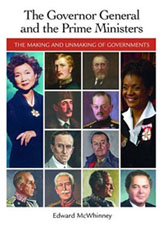 Those who never want to say goodbye to the Queen often urge that the need for unanimous provincial approval of changes involving the constitutional monarchy in Canada makes any such changes practically impossible. But the third complication in the process is actually intended to get around this problem – in some first instance at least.
Those who never want to say goodbye to the Queen often urge that the need for unanimous provincial approval of changes involving the constitutional monarchy in Canada makes any such changes practically impossible. But the third complication in the process is actually intended to get around this problem – in some first instance at least.
To quote from a not entirely friendly source, Upon … the death or abdication of a sovereign … it is customary for the accession of the new monarch to be publicly proclaimed by the Governor General, on behalf of the Queen’s Privy Council for Canada, which meets at Rideau Hall after the accession. And Edward McWhinney, a now retired constitutional lawyer, professor of law, and Member of the Canadian House of Commons, has argued that failure to make this proclamation would result in an empty throne for Canada, leaving the Governor General as full head of state.
Put another way, if e.g., the present reign of the 83-year-old Elizabeth II should unhappily come to a sudden end, without any prior Canadian constitutional amendments regarding the office of the Queen and so forth, a federal prime minister and government so inclined could say goodbye to the British monarchy in Canada without a constitutional amendment, by advising the Governor General of the day not to proclaim any successor to the Queen in Canada.
A cross-country referendum on amending the Constitution … eventually
 There have of course been criticisms of Edward McWhinney’s proposal from Canadian monarchists. And even for ardent republicans it can only be a useful transitional measure. To end the British monarchy in Canada definitively and altogether according to Hoyle, there will no doubt eventually have to be amendments under the Constitution Act 1982 to those parts of the Constitution Act 1867 that still prescribe the Queen’s formal sovereignty over Canada.
There have of course been criticisms of Edward McWhinney’s proposal from Canadian monarchists. And even for ardent republicans it can only be a useful transitional measure. To end the British monarchy in Canada definitively and altogether according to Hoyle, there will no doubt eventually have to be amendments under the Constitution Act 1982 to those parts of the Constitution Act 1867 that still prescribe the Queen’s formal sovereignty over Canada.
Here I come to the final fourth complication in the process of change we are discussing today. I agree that our unhappy experience trying to amend the present Canadian constitution in the early 1990s – under the terms of the so-called Charlottetown Accord, if anyone still remembers that – has made Canadian politicians and related public officials quite reluctant to open up any further cans of constitutional worms for any immediately foreseeable future.
At the same time, however, as I noted earlier, there remain at least two particular dimensions to the present-day Canadian people that still do need some ultimate constitutional clarification in their own right. They are the place of the Quebecois within the larger Canadian people, and the role of similar geographically based diversities in other parts of the country, reflected in the longstanding debate on Canadian Senate reform.
Perhaps because I am not taking the proper medication, I still have faith that at some point we in Canada will at last agree on what to do about these thorny constitutional issues, and move to get it done. When this happens, it will also present an opportunity for constitutional amendments that definitively say goodbye to the British monarchy in Canada.
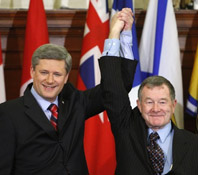 When this opportunity finally arises it seems to me as well that if you look back at the last time we dealt with such matters – in the Charlottetown Accord of 1992 – it was not any inability of all 10 provinces to agree on the details of reform that ultimately made constitutional change impossible. All 10 provinces did agree to the Charlottetown Accord. What finally stopped the thing was its failure to gain majority approval from the practically sovereign people of Canada in a national referendum. This referendum was not necessary under the Constitution Act 1982. But our political leaders of the day felt that the quite large changes envisioned in the Charlottetown Accord had to be endorsed by the Canadian people if they were going to work.
When this opportunity finally arises it seems to me as well that if you look back at the last time we dealt with such matters – in the Charlottetown Accord of 1992 – it was not any inability of all 10 provinces to agree on the details of reform that ultimately made constitutional change impossible. All 10 provinces did agree to the Charlottetown Accord. What finally stopped the thing was its failure to gain majority approval from the practically sovereign people of Canada in a national referendum. This referendum was not necessary under the Constitution Act 1982. But our political leaders of the day felt that the quite large changes envisioned in the Charlottetown Accord had to be endorsed by the Canadian people if they were going to work.
This unwritten precedent, I think, almost certainly means that there will finally have to be a national referendum to end the formal role of the British monarchy in Canada today. And my feeling is that if Canadian republicans can win this referendum, in all 10 provinces, then the approval of all 10 provincial legislatures will look after itself.
This also gives me as much of a conclusion as I have to my complicated and I hope not too vastly confusing remarks here. Whatever else may or may not eventually prove true, the main challenge for all of us who do want to see the end of the British monarchy in Canada is to help build more and more popular support for this objective.
As Bob Hepburn has noted, we already have a majority on our side. The most obvious task ahead is to promote a larger and larger majority among the practically sovereign Canadian people. When this majority is large enough, the now quite obsolete old colonial monarchy in Canada will finally come to an altogether definitive end – like an over-ripe apple falling from a tree.
UPDATE: For more on this subject see an October 19, 2009 article by Randall White in the Toronto Star: “Who is our head of state: Jean or the Queen? … The debate started by Michaëlle Jean touches on the future of the monarchy in Canada.”

